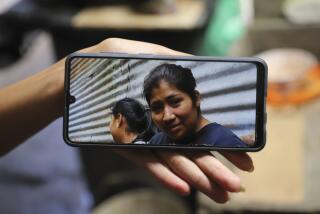Police Asked to Act ‘More Like Children’ : Brazil’s Street Urchins Hold First Convention
- Share via
BRASILIA, Brazil — Coming to this modern capital from the streets of their hometowns, nearly 500 Brazilian children gathered for the world’s first conference of street urchins to voice complaints against society and to suggest solutions.
They were chosen to represent at least 10 million other street children in towns and cities across Brazil, a country of 138 million people.
Still in the tattered clothes they wear in the streets, the children came from all over Brazil in air force planes provided by the government or in buses paid for by donations and the conference organizer, Brazil’s National Movement of Street Children.
They slept in tents donated by the Brazilian army in a city park and were fed mostly a staple diet of rice and beans, provided by the local and federal governments.
6 to 17 Years Old
At the conference, children ranging in age from 6 to 17 unleashed a string of complaints: little or no work, police brutality, family abuse, discrimination and lack of education and health care.
The conference had support from the United Nations Children’s Fund (UNICEF).
“If these kids have survived, it’s because they are genetically excellent, because they should have died along with the 300,000 others who die each year,” said Francisco Silva, a spokesman for UNICEF.
“They are malnourished--not just physically, but mentally.”
At home, the children beg, steal, sell ice cream, shine shoes or sweep bus terminals. Sometimes they make the equivalent of a dollar or two a day; but sometimes, they complained at the conference, adults who hire them chase them off when it is time to be paid.
Some Are Runaways
Some are homeless, either runaways or abandoned by their parents. Others work the streets to help their families, as do most of the children who came to Brasilia for the three-day conference last month.
The idea to gather street children for their own conference began in 1981 with UNICEF, which sent workers to the cities and remote towns of Brazil to find out what, if anything, was being done about homeless and street children.
“Brazil is famous for its street children, and, of course, with the change of government, the idea became more feasible,” said William Myers, a former UNICEF official in Brazil and now a UNICEF consultant in Sacramento, Calif., who helped launch the idea.
Brazil switched to civilian government in March, 1985, after 21 years of military rule.
What UNICEF workers found was small shelters and volunteer programs doing what they could to help the children survive, with the assistance of private donations and government aid.
Thinking They’re Alone
“All these people thought they were the only ones doing this,” Myers said.
Five years and $500,000 later, the scattered shelters banded together to form the National Movement of Street Children, headed by Father Bruno Sechi, a Roman Catholic priest from the northeastern city of Belem.
Sechi, 46, who began working with street children more than 15 years ago, coordinated the conference.
He said that the children themselves wanted to call attention to their plight and that they chose the subjects discussed at the conference.
“The children who came here were chosen by their peers in each city to represent the ones who stayed behind,” said Sechi.
“There are all kinds. There are those who sleep on the streets or spend all day there, working, being exploited, beaten by police or their families.”
6 Conference Topics
In groups, the children discussed six conference topics: work, family, organization, health, education and, most important to them, violence.
At the end of the meeting, they adopted these resolutions:
- Police should be “more like children” and stop beating them.
- Street children who work should be paid the minimum legal salary, and they should be able to get off the streets for at least half a day to attend school.
- They should be issued worker’s cards, as every working Brazilian is required by law to have.
- They want better health care, “love and compassion.”
“The generation that reared us is the same one who criticizes us,” said one of the conference’s final statements.
Most children at the conference said they want to be mechanics, housewives or office workers.
Works as Tour Guide
“Sometimes I work as a tour guide,” said Lucas da Cunha Correia, a 15-year-old who said he went only as far as the fourth grade in school.
Mostly, he added, he does nothing, but when he does work, he earns the equivalent of about a dollar. He added that when he gets older, he will work at anything to help his family of six in Pernambuco, in Brazil’s impoverished northeast.
Claudia Cristina dos Santos, 15, came from Sao Paulo, Brazil’s largest city, where, she said, she survived by stealing after her mother killed her father because “he drank too much.”
“Nobody wanted me, and a judge put me in a home,” she said.
She added that she ran away from the home and heard about the Children’s Project, a small shelter, where she learned about the street children conference here.
“I won’t tell my children what happened to me, but I will fight so they don’t steal,” she said. “I want a happy life for them--a life I couldn’t have.”
More to Read
Sign up for Essential California
The most important California stories and recommendations in your inbox every morning.
You may occasionally receive promotional content from the Los Angeles Times.













